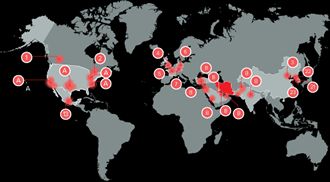 The EU has signed an agreement with industry on cybersecurity and stepped up efforts to tackle cyber-threats which it hopes will trigger €1.8 billion of investment by 2020. It would be a big help to security suppliers, if the UK remained in the EU.
The EU has signed an agreement with industry on cybersecurity and stepped up efforts to tackle cyber-threats which it hopes will trigger €1.8 billion of investment by 2020. It would be a big help to security suppliers, if the UK remained in the EU.
The new public-private partnership is part of a series of new initiatives to better equip Europe against cyber-attacks and to strengthen the competitiveness of its cybersecurity sector.
According to a recent survey, at least 80 percent of European companies have experienced at least one cybersecurity incident over the last year and the number of security incidents across all industries worldwide rose by 38 percent in 2015.
As part of its Digital Single Market strategy the Commission wants to reinforce cooperation across borders, and between all actors and sectors active in cybersecurity, and to help develop innovative and secure technologies, products and services throughout the EU.
Andrus Ansip, Vice-President for the Digital Single Market, said: “Without trust and security, there can be no Digital Single Market. Europe has to be ready to tackle cyber-threats that are increasingly sophisticated and do not recognise borders. Today, we are proposing concrete measures to strengthen Europe’s resilience against such attacks and secure the capacity needed for building and expanding our digital economy.”
Under the plan the EU will invest €450 million, under its research and innovation programme Horizon 2020. Cybersecurity market players, represented by the European Cyber Security Organisation (ECSO), are expected to invest three times more. This partnership will also include members from national, regional and local public administrations, research centres and academia. The aim of the partnership is to foster cooperation at early stages of the research and innovation process and to build cybersecurity solutions for various sectors, such as energy, health, transport and finance.
The Commission also sets out different measures to tackle the fragmentation of the EU cybersecurity market. Currently an ICT company might need to undergo different certification processes to sell its products and services in several Member States. The Commission will therefore look into a possible European certification framework for ICT security products.
A myriad of European SMEs have emerged in niche markets and in well-established markets with new business models (like antivirus software), but they are often unable to scale up their operations. The Commission wants to ease access to finance for smaller businesses working in the field of cybersecurity and will explore different options under the EU investment plan.
Of course this does not apply to the UK. By the time the scheme is ready to go, the UK will have Brexited and will have to find its own source of funds, or not have any cyber security schemes of its own. But at least it can make up its own mind and it still has royality.











